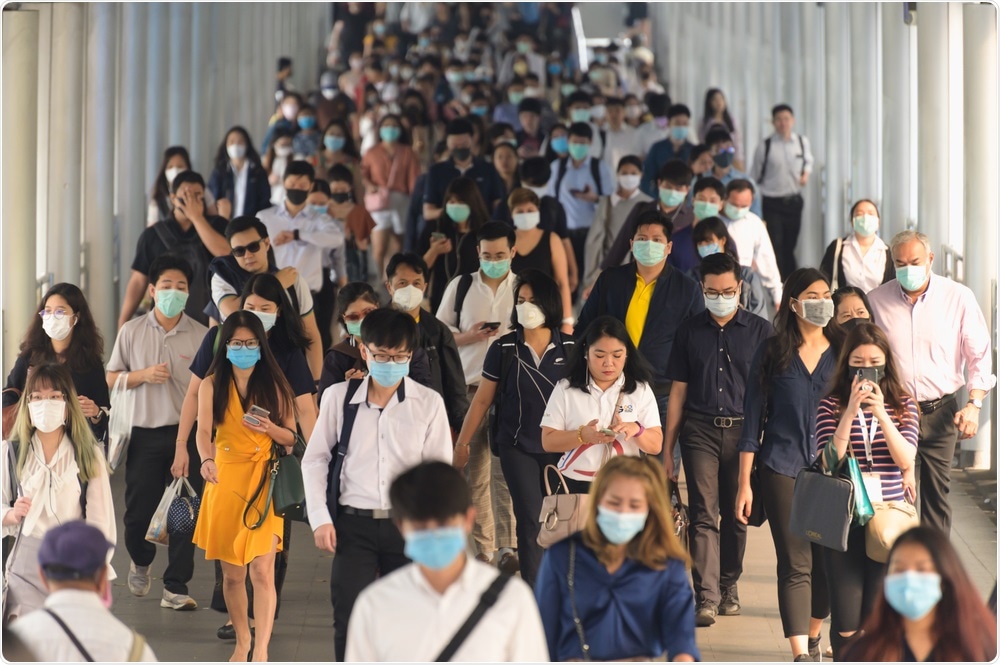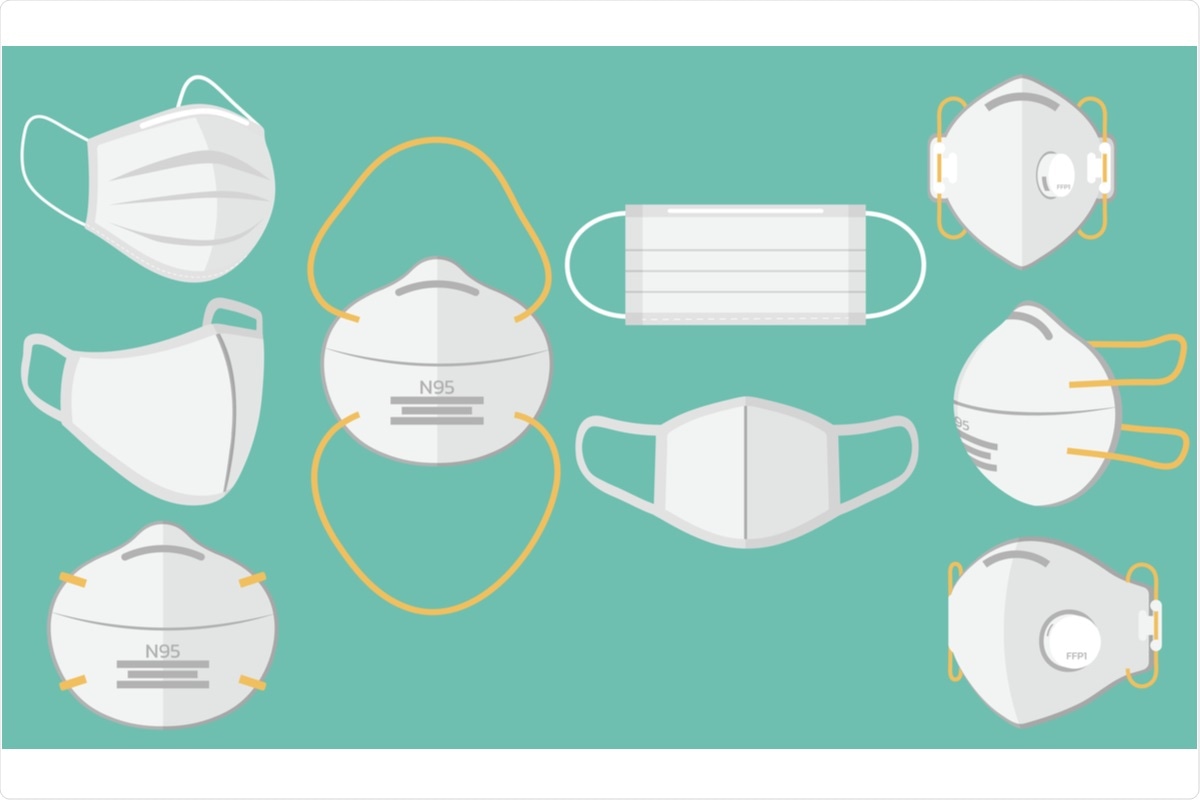The coronavirus disease (COVID-19), which is caused by the severe acute respiratory syndrome coronavirus 2 (SARS-CoV-2), continues to spread globally. As of June 24, 2021, over 179 million cases of COVID-19 have been reported worldwide, with a death toll that is nearly 3.9 million.
Amid the pandemic, non-therapeutic measures to curb the viral spread, particularly mask-wearing, have been effective in some countries. Despite its utility, this practice has been considered a controversial measure since some studies in community settings have reported inconsistent results.
 Study: Mass mask-wearing notably reduces COVID-19 transmission. Image Credit: Cat Box / Shutterstock.com
Study: Mass mask-wearing notably reduces COVID-19 transmission. Image Credit: Cat Box / Shutterstock.com

 This news article was a review of a preliminary scientific report that had not undergone peer-review at the time of publication. Since its initial publication, the scientific report has now been peer reviewed and accepted for publication in a Scientific Journal. Links to the preliminary and peer-reviewed reports are available in the Sources section at the bottom of this article. View Sources
This news article was a review of a preliminary scientific report that had not undergone peer-review at the time of publication. Since its initial publication, the scientific report has now been peer reviewed and accepted for publication in a Scientific Journal. Links to the preliminary and peer-reviewed reports are available in the Sources section at the bottom of this article. View Sources
Researchers from the University of Bristol found that an entire population that wears masks in public leads to a reduction in the transmission of SARS-CoV-2 by almost 26%. The study, which appeared in the pre-print server medRxiv*, demonstrated that around the same time that masks mandates were lifted, the persistence of mask-wearing by a majority of the population led to a notable reduction in SARS-CoV-2 transmission.
Face masks are one of the most popular interventions against COVID-19, with very high uptake in most countries. Recently, the global wearing of masks has begun to decline, even in countries with low vaccination rates.
Confirming the efficacy of mask-wearing is important since only a minority of the global population is expected to be fully vaccinated by the end of 2021. Additionally, the emergence of novel SARS-CoV-2 variants that are highly transmissible and have the potential to evade acquired immunity is also worrisome. The researchers aimed to evaluate the efficacy of mask-wearing in both healthcare settings and the community by reviewing past studies.
Effects of mask-wearing
Masks have at least two effects – preventing viral transmission to non-infected mask-wearers and preventing individuals with COVID-19 from infecting others.
In healthcare settings, N95 masks work well when worn properly by trained users and have been found to reduce the transmission of several coronaviruses, including SARS-CoV-2, by at least half. Surgical masking of non-infected individuals corresponds to a 65% to 75% reduction in their risk of acquiring COVID-19.
Meanwhile, in community settings, clinical studies have shown that fitted surgical masks offer individual results from the meta-analyses, ranging from a 7% increase in infection risk to a 61% decrease in infection risk.
 Image Credit: ST.art / Shutterstock.com
Image Credit: ST.art / Shutterstock.com
The study
In the current study, the researchers aimed to evaluate the ecological effect of a large proportion of the population wearing average masks in the community setting. They also want to determine how the effects of mask-wearing vary between different cultures.
The team investigated inconsistencies within epidemiological studies and found that government mask mandates are not related to large increases in mask-wearing. Further, the team analyzed the effect of mask-wearing on transmission rates, during which they covered 92 regions in six different countries. The researchers of the current study also included the largest survey of individual-level mask-wearing behaviors that included the responses from 20 million participants.
To arrive at the study findings, the team used a hierarchal Bayesian model to estimate the effect of mask-wearing and mask-mandates on transmission rates by associating mandates with reported cases in each region.
The researchers also evaluated the strength of results conducted in a total of 123 experiments across 22 sensitivity analyses. This evaluation found that an entire population that wears masks in public areas results in a median reduction in the SARS-CoV-2 reproduction number of 25.8%, with 95% of the medians between 22.2% and 30.0%.
Conclusions
Taken together, the researchers concluded that wearing face masks is tied to a marked reduction in SARS-CoV-2 transmission. The study suggests that national and state-level mandate data are not enough to model the effect of mass mask-wearing.
In comparison, South Korea’s mask-wearing mandate came after voluntary wearing had already reached 94%. Meanwhile, the Netherlands and Switzerland had imposed mask-wearing mandates but few people were wearing masks. In the Czech Republic, mask-wearing increased but only after the mandate was imposed for a considerable amount of time.
The team also observed that factors other than mandates may have contributed to the worldwide uptake of mask-wearing in 2020.
“This presents a difficulty for policy-makers: if wearing works but mandates are not strongly associated with wearing, what other levers are available? Some options include free mask distribution, domestic supply guarantees, fit training, mask quality guidelines, targeted mandates by the venue, and openness about the benefits of masks.”

 This news article was a review of a preliminary scientific report that had not undergone peer-review at the time of publication. Since its initial publication, the scientific report has now been peer reviewed and accepted for publication in a Scientific Journal. Links to the preliminary and peer-reviewed reports are available in the Sources section at the bottom of this article. View Sources
This news article was a review of a preliminary scientific report that had not undergone peer-review at the time of publication. Since its initial publication, the scientific report has now been peer reviewed and accepted for publication in a Scientific Journal. Links to the preliminary and peer-reviewed reports are available in the Sources section at the bottom of this article. View Sources
Source:
Journal references:
- Preliminary scientific report.
Leech, G., Rogers-Smith, C., Sandbrink, J. B., et al. (2021). Mass mask-wearing notably reduces COVID-19 transmission. medRxiv. doi:10.1101/2021.06.16.21258817. https://www.medrxiv.org/content/10.1101/2021.06.16.21258817v1.
- Peer reviewed and published scientific report.
Leech, Gavin, Charlie Rogers-Smith, Joshua Teperowski Monrad, Jonas B. Sandbrink, Benedict Snodin, Robert Zinkov, Benjamin Rader, et al. 2022. “Mask Wearing in Community Settings Reduces SARS-CoV-2 Transmission.” Proceedings of the National Academy of Sciences 119 (23). https://doi.org/10.1073/pnas.2119266119. https://www.pnas.org/doi/full/10.1073/pnas.2119266119.